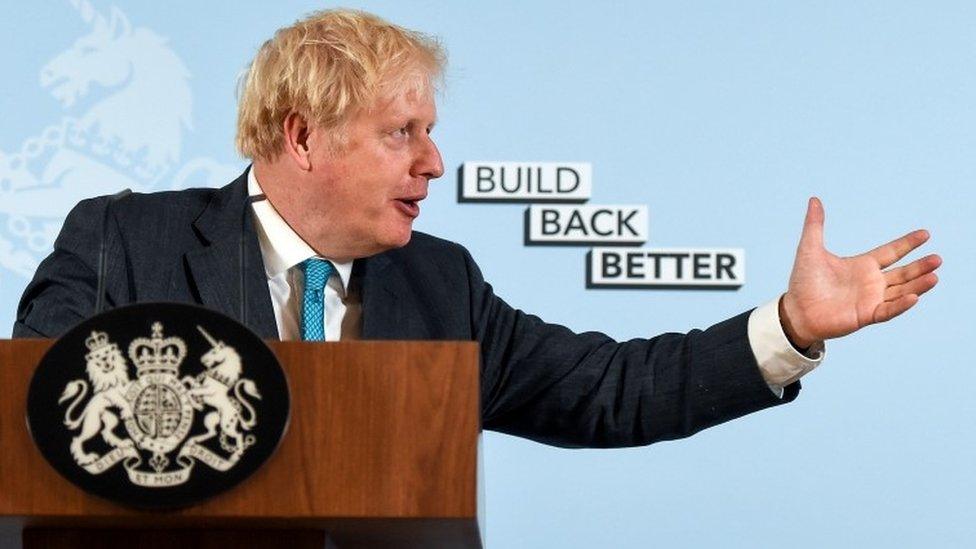Coronavirus rules: Boris Johnson blunders into the backbenches
- Published

"He's making it too easy."
The prime minister rather made the case for some of the malcontents in his own party today, as one of the key rebels joked.
One of the organisers behind backbench moves for more of a say over how the government is handling the pandemic claimed that Boris Johnson's North East coronavirus restrictions blunder underlined their contention - the rules are too complicated, too arbitrary, and haven't been put through the normal grinder of political logic.
Mr Johnson said sorry for getting it wrong shortly after he "misspoke" (political speak for getting it wrong), but it gave more immediate ammunition to the opposition too, who accused the prime minister of "gross incompetence".
Forget the politics between Number 10 and Labour for a second, and the relationship between Downing Street and the backbenches too, it hardly seems unreasonable for the public to expect that the prime minister would be able to demonstrate a clear grasp of the rules the government has put into force.
It seems unlikely that his comments are going to help the public's sense that the rules are clear, firm, and important to follow.
Mr Johnson's "misspeak" (being diplomatic), also comes at the crescendo of a tricky moment between Downing Street and grumpy and restless Tory MPs.
Overtly critical
For some days, backbenchers have been pushing for a way of seeking more influence over, not just the government's decisions on coronavirus, but how Parliament gets involved.
As we talked about here, backbenchers were part of what held Number 10 back from going for tighter rules as coronavirus cases rose last week. And since then, many of them have been pushing for a more permanent way of making sure they are heard.
It is not just a group of standard rebels either, who love chucking a few political punches, but the chair of the 1922 Committee, Sir Graham Brady, the Tories' shop steward, if you like, is at the head.
It is not normal for the occupant of that position to be overtly critical in this way.
Without diving in to the parliamentary weeds from where few return, here's the short version of what they want.
Ministers have been bringing in some pretty draconian new rules very quickly during the pandemic, without anything like the normal argy bargy and checks and balances of grinding through Parliament.
MPs now want to make sure they have more of a say.
And they are also less forgiving of the government, more sceptical of the scientific advice ministers are being offered and more worried about the economy than back in March.
'Sheer number'
What is not surprising is that ministers are less than delighted about having to concede more of their power.
What is surprising is that those organising the rebellion, (and they are extremely organised) say that they have as many as 80 of their Tory colleagues willing to defy Number 10.
In other words, despite the government's thumping majority, if this goes to a vote, Downing Street is likely to lose.
Hold on though.
First off, for reasons that require a full dunking in the parliamentary weeds which I will spare you, the demand for MPs to have more of a say may never be called to a vote - the tweak to the legislation that Sir Graham is calling for may not be determined "in scope" by the Speaker.
If it's not debated, there won't be a vote, so the government can't lose, or win for that matter.
For days Downing Street has been pretty sure that the vote won't happen. So why budge?
The numbers of MPs upset is big enough for ministers to have to take it seriously. As one of them told me, they think "the government is going to have to give us something by the sheer number".
So tonight the leader of the House of Commons is meeting Sir Graham and there is talk of a compromise.
The rebels' hope is a vote for Parliament before any new regulations come into force.
Ministers may only offer a chance at retrospective approval.
Wherever the talks end up, there is clearly enough concern in government that it is being taken seriously now. And it is possible that by morning a deal will have been brokered.
Even administrations that thrive on controversy and revel in power, often need Parliament on their side.

SOCIAL DISTANCING: What are the rules now?
SUPPORT BUBBLES: What are they and who can be in yours?
LOOK-UP TOOL: How many cases in your area?

